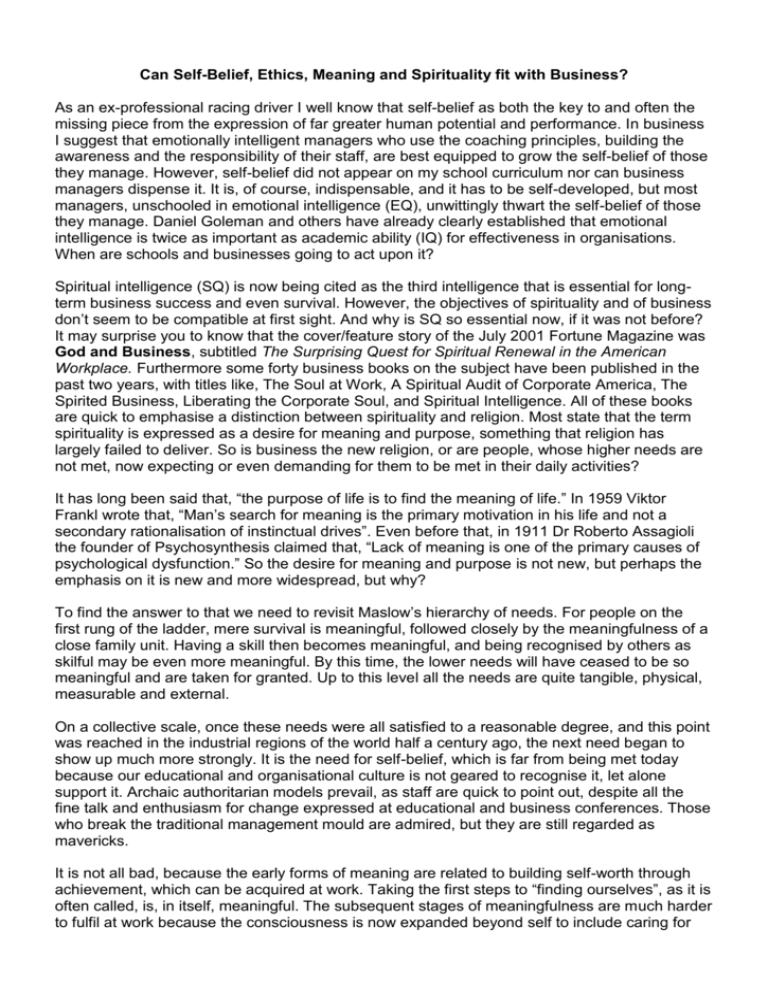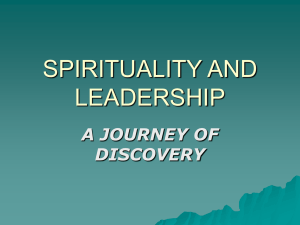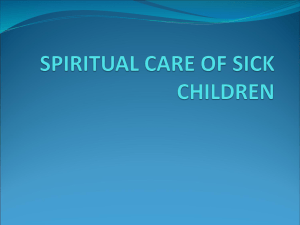Can Self-Belief, Ethics, Meaning and Spirituality fit with Business?
advertisement

Can Self-Belief, Ethics, Meaning and Spirituality fit with Business? As an ex-professional racing driver I well know that self-belief as both the key to and often the missing piece from the expression of far greater human potential and performance. In business I suggest that emotionally intelligent managers who use the coaching principles, building the awareness and the responsibility of their staff, are best equipped to grow the self-belief of those they manage. However, self-belief did not appear on my school curriculum nor can business managers dispense it. It is, of course, indispensable, and it has to be self-developed, but most managers, unschooled in emotional intelligence (EQ), unwittingly thwart the self-belief of those they manage. Daniel Goleman and others have already clearly established that emotional intelligence is twice as important as academic ability (IQ) for effectiveness in organisations. When are schools and businesses going to act upon it? Spiritual intelligence (SQ) is now being cited as the third intelligence that is essential for longterm business success and even survival. However, the objectives of spirituality and of business don’t seem to be compatible at first sight. And why is SQ so essential now, if it was not before? It may surprise you to know that the cover/feature story of the July 2001 Fortune Magazine was God and Business, subtitled The Surprising Quest for Spiritual Renewal in the American Workplace. Furthermore some forty business books on the subject have been published in the past two years, with titles like, The Soul at Work, A Spiritual Audit of Corporate America, The Spirited Business, Liberating the Corporate Soul, and Spiritual Intelligence. All of these books are quick to emphasise a distinction between spirituality and religion. Most state that the term spirituality is expressed as a desire for meaning and purpose, something that religion has largely failed to deliver. So is business the new religion, or are people, whose higher needs are not met, now expecting or even demanding for them to be met in their daily activities? It has long been said that, “the purpose of life is to find the meaning of life.” In 1959 Viktor Frankl wrote that, “Man’s search for meaning is the primary motivation in his life and not a secondary rationalisation of instinctual drives”. Even before that, in 1911 Dr Roberto Assagioli the founder of Psychosynthesis claimed that, “Lack of meaning is one of the primary causes of psychological dysfunction.” So the desire for meaning and purpose is not new, but perhaps the emphasis on it is new and more widespread, but why? To find the answer to that we need to revisit Maslow’s hierarchy of needs. For people on the first rung of the ladder, mere survival is meaningful, followed closely by the meaningfulness of a close family unit. Having a skill then becomes meaningful, and being recognised by others as skilful may be even more meaningful. By this time, the lower needs will have ceased to be so meaningful and are taken for granted. Up to this level all the needs are quite tangible, physical, measurable and external. On a collective scale, once these needs were all satisfied to a reasonable degree, and this point was reached in the industrial regions of the world half a century ago, the next need began to show up much more strongly. It is the need for self-belief, which is far from being met today because our educational and organisational culture is not geared to recognise it, let alone support it. Archaic authoritarian models prevail, as staff are quick to point out, despite all the fine talk and enthusiasm for change expressed at educational and business conferences. Those who break the traditional management mould are admired, but they are still regarded as mavericks. It is not all bad, because the early forms of meaning are related to building self-worth through achievement, which can be acquired at work. Taking the first steps to “finding ourselves”, as it is often called, is, in itself, meaningful. The subsequent stages of meaningfulness are much harder to fulfil at work because the consciousness is now expanded beyond self to include caring for others. So long as that expanded consciousness is limited to one’s work team or company, the work place remains a forum for meaning. However the time comes when a consciousness expands to include first stakeholders, then the community and eventually all of humanity. Meaning takes the form of care and concern for the wider constituency. This often does not fit well within the corporate environment, unless the products and services of that company are clearly for the common good. Products and services designed solely to enrich shareholders and directors are seen as an anathema, as is manipulative or dishonest corporate behaviour, the wanton use of non-renewable resources, or the degradation of the environment. Both employees and customers are inevitably mounting Maslow’s ladder due to social evolution driven mainly by ever-increasing affluence and instant and greater information availability so that more and more people are reaching the level at which meaning matters most. This impacts the workplace directly. Business has never been a den of angels, but of late the venal nature of capitalism has been repeatedly exposed. IOS, Guiness, Enron, Worldcom, Exxon, Andersen, Nestle, BAT, McDonalds the list is endless; all companies that have in one way or another stepped way outside the border which defines normal human decency. How can anyone find meaning and purpose working within such a business environment? They can’t and they won’t, and if they do stay at their post, it will be only to do as little as they can get away with. Staff with any vision or values cannot but be repulsed by what they hear and read in the business press today. The old business legend and GE guru Jack Welch has fallen off his perch into the excrement of his own excess. In Britain, GlaxoSmithKline’s disgracefully greedy ChiefExecutive, Garnier, dragged the reputation of big businesses down to a new low. Even those longstanding Fat Cat clubs, the CBI and the IoD, seemed to be embarrassed that Garnier had gone a step too far by pocketing £11 million for having presided over a 40% loss in share value. Of course we would not have minded if the share price had gone up, said Sir John Egan of the CBI. Up or down, excess is excess in my book. And being greedy just because “I could get that abroad” is no excuse. Never has the ugly face of capitalism been uglier than in recent years. It is said that change only occurs where and when there is enough pain. Well, the pain is here and now for all to see, and change is in the air. While one half of the corporate world behaves more and more like the mafia, the other half is waking up to Corporate Social Responsibility. Ethical investment funds are attracting more and more investors, environmental and social auditors are busy, value statements are for real, triple bottom line reporting is expected and provided, and the term Spiritual Intelligence is spoken and heard without embarrassment. The new gurus are Stephen Covey, Deepak Chopra, Tony Robbins, Danah Zohar, Michael Lerner and the like. In fact it was Rabbi Michael Lerner who many years ago undertook a survey of shop floor workers in the States to see what motivated them. Believing that the answer would be “more money” and that the search for meaning was the province of the middle classes, he was humbled and surprised to find that they too placed meaning and purpose as a primary goal. It is clear that when these deeper needs are not met, people seek money as the compensation. This suggests that if people’s higher needs are met, their wage demands might not be so great. This is substantiated by Frankl’s experiences in a Nazi concentration camp where he discovered that those people who met their own spiritual needs, were better able to survive starvation on less. For work to be meaningful, it has to add value to self, to ones immediate colleagues, to the community or to the world. People often move from one to the next to become ever more inclusive in their consciousness and caring. As I stated before, self-belief is paramount for workplace performance. And when will business leaders recognise that people want to contribute their efforts and skills to their community, and that when their company’s products and services are there, not just for money, but for the common good, their staff will feel fulfilled and be self-motivated. Beyond meaning lies purpose. That we live in a purposeful universe is a widespread spiritual concept. I am not here to argue whether that it is true or not, but I do know that those people who choose to live as if it were true, often find their true purpose. Whether that is their true purpose or not is a second paradox, but if they feel it is, and it enriches their lives and gives them fulfilment. Don’t knock it unless you have tried it. When you do, it will work for you too. If it doesn’t, you did not really try it.





